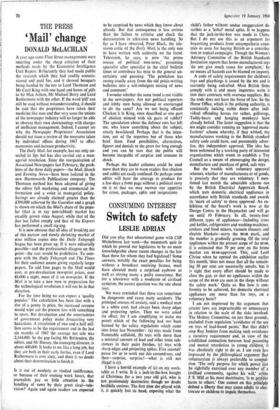Switch to safety
CONSUMING INTEREST LESLIE ADRIAN
Did you play that educational game with Cliff Michelmore last week—the mammoth quiz in which he proved our legislators to be no more knowledgeable about recent changes in the law than those for whom they had legislated? Some answers, notably the exact penalties for being without a broadcast receiving licence, must have elevated many a surprised eyebrow as well as stirring many a guilty conscience. But for a televiewer with a modicum of civilised cynicism, the easiest question was the one about toys.
We were reminded that these can sometimes be dangerous and cause nasty accidents. The principal sources of anxiety, said a medical man in a white coat, had always been sharp edges and projecting spikes. Then we were asked (in effect, for I am simplifying to make my point) which of the following had not" been banned by the safety regulations which came into force last November : (a) toys made from flammable celluloid, (b) toys with more than a minimal amount of lead and other toxic sub- stances in their paint finishes, (c) toys with sharp edges and projecting spikes. Five seconds' pause for us to work out this conundrum, and then—surprise, surprise !—what is still not illegal is (c).
I have a horrid example of (c) on my work- table as I write. It is a jack-in-the-box bought at Christmas for a two year old girl, who is not passionately destructive though no doubt healthily curious. The first time she played with it, it quickly lost its head, exposing what the child's father without undue exaggeration de- scribes as a 'lethal' metal spike. It so happens that the jack-in-the-box was made in China. But I do not use this as an argument for boycotting products from unsympathetic coun- tries or even for buying British as a contribu- tion to topical campaigns. Though the Women's Advisory Committee of the British Standards Institution reports that home-manufactured toys `do not give much cause for complaint,' by no means all hazards can be blamed on imports.
A code of safety requirements for children's toys and playthings is issued by the ast and is currently being redrafted. Most British firms comply with it and many importers write it into their contracts with overseas suppliers. But the code does not have the force of law. So the Home Office, which is the policing authority, is continually locking stable doors after indi- vidual offending horses (or rather, golliwogs, Teddy-bears and hanging monkeys) have already bolted. The latest suggestion is that the asi might consider running an 'approved manu- facturer' scheme whereby, if they wished, toy manufacturers working to the British standard safety code could have, and presumably adver- tise, this independent approval. The idea has been welcomed by a working party of interested organisations which wants to establish a Toy Council as a means of encouraging the design, manufacture and purchase of good, safe toys.
But the trouble with voluntary approval schemes, whether of manufacturers or of goods, is precisely that they are voluntary. I men- tioned last month the admirable scheme run by the British Electrical Approvals Board, which tests domestic electrical appliances in accordance with British standards and awards its 'mark of safety' to those approved. An ex- hibition of the board's work is now at the Design Centre in the Haymarket and will go on until 10 February. In all, twenty-four different types of appliances—including irons and kettles, refrigerators and washing-machines, cookers and food mixers, vacuum cleaners and electric blankets—carry the BEAB mark, and the number is gradually growing. Of the total appliances within the present scope of the BEAB, it is estimated that 70 per cent on the home market are BEAB-approved. This, said Lord Citrine when he opened the exhibition earlier this month, 'does not mean that all the remain- ing 30 per cent are necessarily unsafe, but it is right that every effort should be made to close the gap, so that no appliances within the scope of the BEAB are seen in the shops without the safety mark.' Quite so. But how is con- formity to be achieved, for domestic electrical appliances any more than for toys, on a voluntary basis?
I am not impressed by the argument that stricter laws are impracticable or unnecessary in relation to the scale of the risks involved. The Molony Committee, on just these grounds, excluded from regulation 'avoidance of the use on toys of lead-based paints.' But that didn't stop Roy Jenkins from making such avoidance a statutory requirement and, in view of the established connection between lead poisoning and mental retardation in young childred, it was absolutely right to do so. I am even less impressed by the philosophical argument that Voluntaryism is always preferable to compul- sion. 'The only purpose for which power can be rightfully exercised over any member of a Civilised community, against his will,' wtbte J. S. Mill at his most doctrinaire, 'is to pretitnt harm to others.' One cannot on this principle defend a liberty that may cause adults to elec- trocute or children to impale themselves.


































 Previous page
Previous page